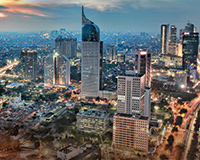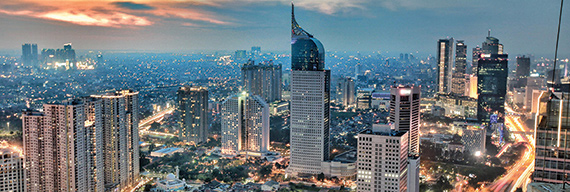After years of rapid growth, Indonesia’s economy shows signs of slowing –
but investors are still being attracted to the energetic and youthful country.
Helen Roxburgh reports
 Step out of Jakarta airport and one of the first things that strikes you is the vast swathe of people, coming and going in all directions on frenzied, gridlocked roads.
Step out of Jakarta airport and one of the first things that strikes you is the vast swathe of people, coming and going in all directions on frenzied, gridlocked roads.
Head to one of the other 13,000 islands in Indonesia’s archipelago, and you can find sleepy fishing villages, golden beaches and bustling tourist spots. Indonesia is a country of immense contradictions, and therein lies much of its appeal – and opportunity.
But after five years of exponential growth, is there still an appetite to invest in Indonesian real estate? Or is the window closing fast?
Looking at the growth figures, it seems as though it will take more than a GDP slowdown to knock this market off the map. Java , home to the capital of Jakarta, is a thriving business hub, and the main business district for the region. With more working-age people than ever before (the average age is 29), Indonesia could be one of the world’s five largest economies by 2030, according to consultancy PwC. Many international businesses have reported soaring revenues in the market; only this week consumer giant Unilever announced a 28% rise in its Indonesian profits.
The country has also seen huge growth in the real estate market, with prices more than doubling since 2009. Since sweeping to power last year, president Joko Widodo has been promoting the country as a home for international investment – particularly as its economy has been hit by the price of global commodities, which make up more than half of the country’s exports.
Last month the UK government committed £1bn of financing into the emerging South East Asian country; a trade delegation from Turkey visited last week. New international retailers are looking to enter Indonesia following the likes of H&M, Parkson and big-box retailer Courts Megastore.
And alongside these moves, the new government is discussing opening up foreign ownership of land. Currently international groups can own office space outright, but homes can only be directly owned by domestic buyers. Developers have been urging the government to open up the market for years.
This significant boost, which now looks more likely than ever before, would complement other strong fundamentals. Construction costs remain among the cheapest in Asia, while the country has a huge group of middle-earners (set to double again in the next five years), and an undersupply of good quality grade-A offices to put them in. The latest Jakarta report from Colliers International tips the finance-related industries, a growing IT/telecommunications sector and energy services sectors as some large future occupiers.
Jakarta’s first metro line is scheduled to open in 2018, which will make a huge difference to commuters – many of whom spend hours getting home on gridlocked roads. It is also expected to boost values in adjacent areas by around 30-40% according to Knight Frank.
The market reached dizzying heights in 2013 when a report from PwC and the Urban Land Institute placed Jakarta as the top investment destination in Asia; the city soared to the top from 11th place the year before.
This was in the middle of a buying frenzy in Indonesia;. With prices rising faster than almost any other market in Asia, purchasers rushed to buy.
“The market was really strong for several years, and booming through 2011 to 2013,” says Todd Lachlan, country head for Indonesia at JLL. “Land prices increased at least a minimum of two to three times in that time.
“The office market tripled in terms of grade A, and almost doubled for grades B and C.”
But those rapid rates of growth have dissipated. “Residential prices have gone up 300% or 400% since the global financial crisis, so that easy money has really been made,” says Dougie Crichton, technical advisor at Farpoint Prima, the real estate subsidiary of Indonesian conglomerate Gunung Sewu Kencana. “Resi rates came from a very low base – they were extremely cheap compared to other places in Asia. Now I think they are more or less equal with Kuala Lumpur. There is still growth but not the huge jump we saw from the crisis up until last year.”
Inflowing investment into real estate reached $758m (£786m) in 2014, according to Real Capital Analytics – the highest level over the past eight years.
In 2015, the market has begun to slow a little. Office rents in Jakarta have fallen by 1% this year so far, according to JLL, with capital values down by 2%. Retail rents saw stronger growth at 4%, but are still below almost every other major Asian city. The country’s GDP slipped below 5% for the first time in five years.
But country experts are not despondent at these slowing rates. JLL’s Lachlan describes the current market as a more “natural real estate market”, steady and with more realistic asset pricing.
And the Indonesians’ ability to buy remains on an upward trajectory. The average level of personal wealth has increased four-fold since the year 2000, according to the Credit Suisse Global Wealth Report, with apartments seen as a desirable investment with capital gains of between 10-25% and rental yields between 6-8% per year. Purchasers are also predominantly buying in cash, although the government has recently also announced plans to expand mortgage lending.
“The people buying tend to finance their purchase through cash, not a mortgage. They are fairly wealthy and want to keep it for the long term. So there is no panic, and no great price correction expected,” says Crichton.
“It is a difficult market now,” says Hasan Pamudji, head of Indonesia research at Knight Frank. “The real estate market after the presidential election really started to slow down. And then the economy started to slow down at the same time, and this year we saw the China slowdown, and commodities started to slow down as well. These all had an impact on our economy. People started to adopt a ‘wait and see’ mode.
“But this doesn’t mean the wealth is gone.”
“People adopted a ‘wait and see’ mode.
But that doesn’t mean the wealth is gone”
This pent-up wealth is a key motivator for international investors; concerns around a lack of market transparency and local corruption is a central reason for entering the market with a partner. Interest remains strong, and this year’s PwC and ULI report quotes one investor saying Indonesia is “the one market where I still hear the same amount of interest as before”.
And even as the market has slowed, real estate groups have continued to enter Indonesia.
In November 2014, Singapore’s sovereign wealth fund GIC signed a $500m agreement with Rajawali Group, one of Indonesia’s largest investors, to invest in office, retail, residential and mixed-use schemes. Hot on its heels was a deal between property giant CapitaLand and a subsidiary of Indonesian real estate group Credo Group to develop a $220m integrated development in central Jakarta – its first integrated investment, although it had previously had a serviced apartment arm in the country.
And in May this year, Singapore-based developer Ascendas Group made its Indonesian debut when it formed a joint venture with PT Metropolitan Karyadeka Development to build a $300m mixed-use project in Tangerang, close to Soekarno-Hatta airport.
“There are quite a number of international developers who are active in the Indonesia market – Jakarta is their main destination as these international developers put their trust in this market and still see it as very alluring compared to other cities in Indonesia,” says Kazim Ali Bokhari, associate director at CBRE partner firm PT Leads Property Services Indonesia.
Other developers and investors are also known to be actively looking at the market.
“There are still opportunities for funds looking at Indonesia; the problem is finding the right opportunity,” adds Lachlan.
A small but growing focus has turned to Indonesia’s emerging cities, such as Surabaya, Medan and Bandung, locations with international airports, rail links or seaports, and the presence of international hotel brands such as Hilton.
And as with many Asian markets, logistics has been a hot topic for Indonesia. Cikarang, for example, is home to one of Java’s key cargo handling sites and a 494-acre dry port. “The demand for logistics has been significant in Indonesia, with many large international companies dominating commercial goods transportation and freight, such as DHL and FedEx,” says Ali Bokhari. “The demand for warehouses has also increased immensely.”
The number of internet users in Indonesia has risen by 150% a year over the past decade to reach 90m, and while ecommerce has yet to take off the way it has in China and other Asian markets, analysts expect future growth, meaning more warehousing and logistics infrastructure.
“It could well be one of the big areas for anyone who wants to get a foot on the ground now, before the market develops,” says Lachlan.
President Widodo has offered a vision of upgrading Indonesia’s infrastructure, although analysts caution that the government alienates businesses at times through contradictory investment rumours, including a luxury tax which could ramp up duties paid on property purchases. PwC and the ULI conclude in their 2015 study that “investors should note the difficulties of operating in Indonesia and even finding investable assets there”, warning the opacity of the market can make investment difficult.
Nonetheless, the PwC/ULI report still has so much confidence in the Indonesian market, it rates it as second in their city investment rankings, putting it above Singapore, Sydney and Shanghai.
With a government poised to open the market up to foreign buyers, plus Indonesia’s young population and growing wealth, there are still many opportunities for savvy real estate development and investors who can hunt out the best opportunities.












